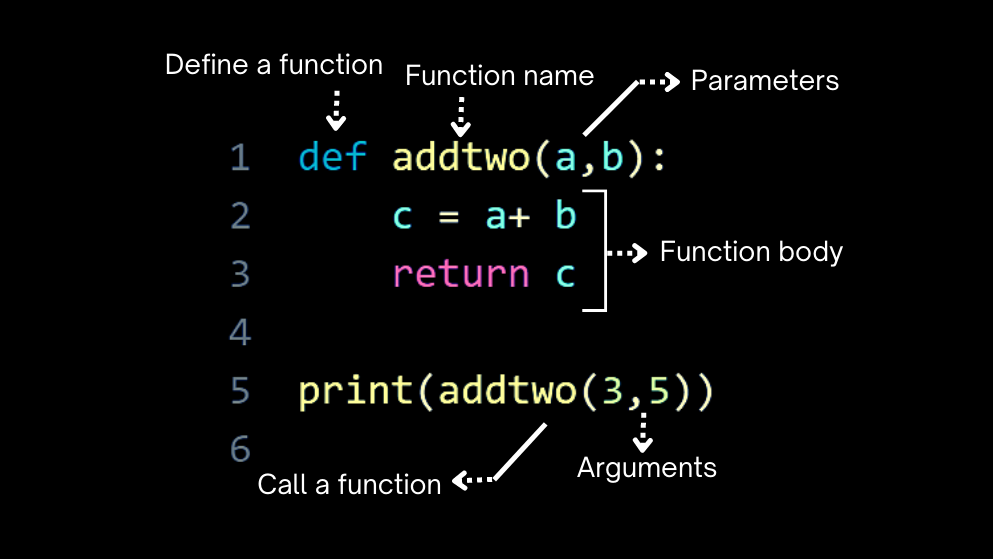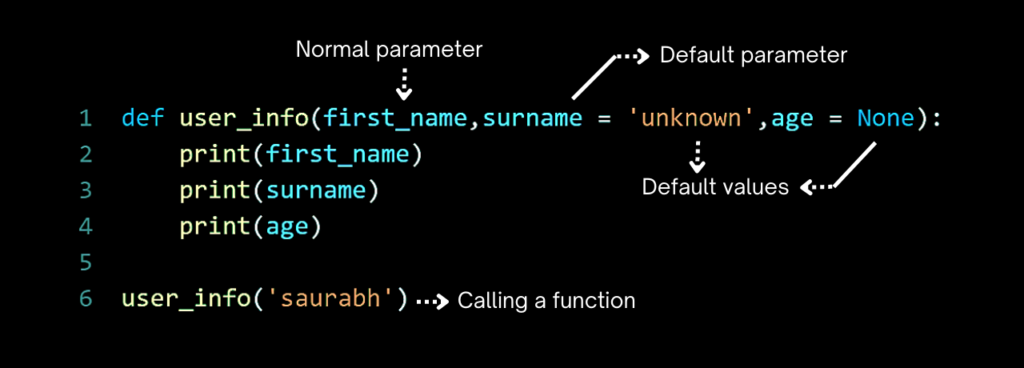In this post, you will learn what is a function in python, how to define a function, how to call a function, functions with parameters, default parameters, built-in functions, and so on.
So let’s start learning all the things one by one:
What is a function in Python?
A function is a block of code that performs a specific task when it is called, and functions are reusable, which means you can write a function once and use it as many times as you want.
Another definition:
A function is a block of code that you write once and can run as many times as you want in a program.
Types of functions
there are two types of functions in python and they are as follows.
- built-in function.
- user define function.
1. Built-in Function
Built-in Functions are predefined functions in python.
there are many built-in functions in python few are listed below.
List of built-in functions
| print() | len() | min() |
| max() | input() | type() |
| dict() | list() | int() |
| tuple() | set() | sorted() |
2. User define function
A function defined by the user is called the user-defined function and it performs its assigned task after calling it.
For Function two things are important.
- Function definition.
- Function call.
Define a function
def keyword is used to define a function in python.
Example:
# define a function
def addtwo(a,b):
c = a+ b
return c
print(addtwo(3,5))
#calling a functionOutput:
8Function call
Calling a function is very easy just write a function name with a set of parenthesis.
example: addtwo(3,5) (as shown in above program)
Below figure help you to understand all the terms related to function.

let’s do some programs using a function for better understanding.
Example for Practice
Write a Python program to check even and odd numbers by using a function.
Source code:
def odd_even(num):
if num % 2 == 0:
return 'Even'
else:
return 'Odd'
print(odd_even(3))
print(odd_even(4))
print(odd_even(6))
print(odd_even(5))
print(odd_even(7))Output:
Odd
Even
Even
Odd
OddWrite a python program to find the greatest number from three numbers
Source code:
def greatest(a,b,c):
if a>b and a>c:
return a
elif b>c:
return b
else:
return c
print(f"{greatest(45,35,53)} is greatest")Output:
53 is greatestWrite a python program to check for palindrome.
Source code:
# check your name is same in reverse order or not
def name_check(n):
if n == n[::-1]:
return True
else:
return False
name = 'Saurabh'
name2 = 'naman'
print(f"{name} is palindrome :{name_check(name)}")
print(f"{name2} is palindrome : {name_check(name2)}")Output:
Saurabh is palindrome :False
naman is palindrome : TrueCall a function inside a function
Source code:
def greater(a,b):
if a>b:
return a
else:
return b
def greatest(a,b,c):
bigger = greater(a,b) # calling a greater() function here
return greater(bigger,c)
num1 = 75
num2 = 85
num3 = 35
print(f"{greatest(num1,num2,num3)} is greatest")Output:
85 is greaterDefault parameters
Below figure help you to understand, what are default parameters.

if values are not passed to default parameters then default values are printed and if values pass to default parameters then default values replace with passed values (or passed argument).
Example:
def default(name = 'unknown',surname = 'unknown',age = None):
print(f"your name is {name} ")
print(f"your surname is {surname} ")
print(f"your age is {age} ")
print('calling function with no arguments')
default()
# all default values printed because we are not pass any arguments
Output:
calling function with no arguments
your name is unknown
your surname is unknown
your age is NoneWhen arguments pass in function then default parameters replace with passed arguments.
Example:
def default(name = 'unknown',surname = 'unknown',age = None):
print(name)
print(surname)
print(age)
default('saurabh','tiwari')
#default values replace with passed argumentsOutput:
saurabh
tiwari
NoneHere default values of name & surname variables replace with passed arguments.
NOTE: Always make the last parameter as a default parameter otherwise you will get an error (this thing is valid In case of using only default parameter and normal parameter at the same time).
Hope this post adds some value to your life -thank you.






